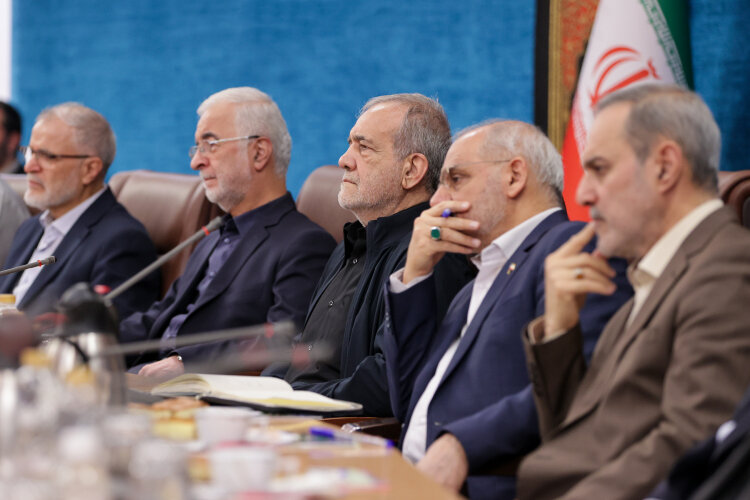National resolve proved during Israeli-imposed war against Iran: Pezeshkian

TEHRAN – Iran’s President Masoud Pezeshkian has praised the people’s resilience during the recent war with Israel, saying the conflict demonstrated the Islamic Republic’s deep national cohesion and unshakable resolve in the face of external aggression.
Speaking at a national meeting of provincial governors held Monday at the Ministry of Interior, the president began by honoring the memory of the war’s martyrs and lauding the public’s unwavering support. “Our people endured 12 difficult days with patience and solidarity, and their support thwarted the enemy’s sinister plans,” he said. “This trust doubles our responsibility—we must now serve the people with more dedication than ever.”
Pezeshkian highlighted the role of the Leader’s “firm and decisive” leadership during the war, stating that the seamless replacement of top commanders after Israeli assassinations demonstrated the Islamic Republic’s strength and continuity. “The enemy did not expect our command structure to remain intact and operational, but this showed that hope and power are alive in Iran,” he said.
The president emphasized the government’s firm commitment to decentralization and delegation of authority, describing it as a strategic path forward. “We must resolve challenges not by top-down orders, but through coordination, solidarity, and local empowerment,” he noted, adding that each governor must act as the “president of their province,” exercising authority with speed, insight, and justice.
Addressing the importance of justice and inclusivity, Pezeshkian stated: “Every citizen—regardless of ethnicity, religion, or political orientation—must be treated fairly. This includes justice in appointments, management, and public interaction.”
He went on to praise the contributions of provincial officials during the war, noting that many exceeded expectations. “Some governors demonstrated exceptional capabilities, proving that merit and performance—not connections—must define appointments.”
The president also called for strengthening grassroots institutions such as mosques, local NGOs, and the Basij as part of a national strategy for neighborhood-based governance. He cited Iran’s 80,000 mosques as potential hubs for public engagement, saying such infrastructure can support initiatives in healthcare, education, and community resilience.
Referring to the successful recent campaign for school construction in deprived areas, Pezeshkian called it a “model of social participation that should inspire similar efforts nationwide.”
Touching on Tehran’s deepening water crisis, he acknowledged that the problem stems from years of mismanagement and demanded a scientific, long-term approach to national resource governance. “We must stop blaming others and take responsibility,” he said.
Pezeshkian concluded by echoing the Leader’s call for national unity. “Defending this country is not the duty of a single group or ideology. Everyone who loves Iran must step forward, regardless of appearance or belief. The war showed us that national cohesion is both possible and necessary.”
Interior Minister Eskandar Momeni, who also spoke at the event, outlined the government’s “neighborhood-based governance” policy, emphasizing the importance of mobilizing grassroots capacity and managing migration in a secure and balanced way.
Governors from across the country shared their experiences from the war, saying that delegated authority had allowed for faster, more efficient decision-making. They called for inter-agency coordination to be institutionalized to ensure this efficiency continues in peacetime.
Leave a Comment